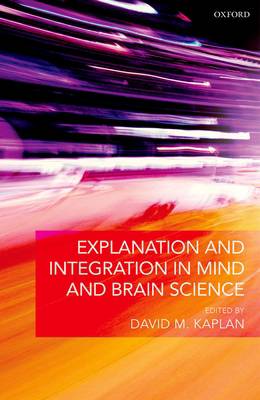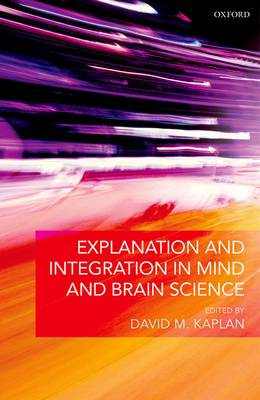
Door een staking bij bpost kan je online bestelling op dit moment iets langer onderweg zijn dan voorzien. Dringend iets nodig? Onze winkels ontvangen jou met open armen!
- Afhalen na 1 uur in een winkel met voorraad
- Gratis thuislevering in België vanaf € 30
- Ruim aanbod met 7 miljoen producten
Door een staking bij bpost kan je online bestelling op dit moment iets langer onderweg zijn dan voorzien. Dringend iets nodig? Onze winkels ontvangen jou met open armen!
- Afhalen na 1 uur in een winkel met voorraad
- Gratis thuislevering in België vanaf € 30
- Ruim aanbod met 7 miljoen producten
Zoeken
€ 108,45
+ 216 punten
Omschrijving
This collection brings together a set of new papers that advance the debate concerning the nature of explanation in mind and brain science, and help to clarify the prospects for bonafide integration across these fields. Long a topic of debate among philosophers and scientists alike, there is growing appreciation that understanding the complex relationship between the psychological sciences and the neurosciences, especially how their respective explanatory frameworks interrelate, is of fundamental importance for achieving progress across these scientific domains. Traditional philosophical discussions tend to construe the relationship between them in stark terms - either they are related in terms of complete independence (i.e., autonomy) or complete dependence (i.e., reduction), leaving little room for more interesting relations such as that of mutually beneficial interaction or integration. A unifying thread across the diverse set of contributions to this volume is the rejection of the assumption that no stable middle ground exists between these two extremes, and common embrace of the idea that these sciences are partially dependent on or constrained by one another. By addressing whether the explanatory patterns employed across these domains are similar or different in kind, and to what extent they inform and constrain each another, this volume helps to deepen our understanding of the prospects for successfully integrating mind and brain science.
Specificaties
Betrokkenen
- Auteur(s):
- Uitgeverij:
Inhoud
- Aantal bladzijden:
- 270
- Taal:
- Engels
Eigenschappen
- Productcode (EAN):
- 9780199685509
- Verschijningsdatum:
- 7/02/2018
- Uitvoering:
- Hardcover
- Formaat:
- Genaaid
- Afmetingen:
- 160 mm x 236 mm
- Gewicht:
- 675 g

Alleen bij Standaard Boekhandel
+ 216 punten op je klantenkaart van Standaard Boekhandel
Beoordelingen
We publiceren alleen reviews die voldoen aan de voorwaarden voor reviews. Bekijk onze voorwaarden voor reviews.











